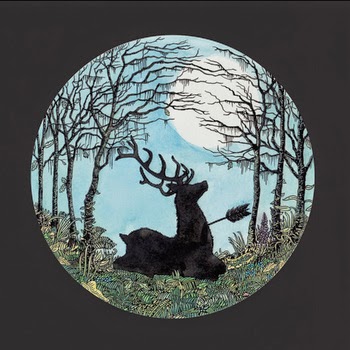From its opening line onward, Bridie Jackson and The Arbour’s second album New Skin embraces contradiction. Preceded only by her guitar, Jackson cries out, in a register somewhere between forlorn and content, between anxious and soothed: "Villainise all I see / Even those who carry me".
Note the use of villainise, not vilify. The unusual opening verb alone speaks of a new skin, of taking otherwise familiar words and forms and repurposing them in a profitably and suitably subtle manner so as to break convention, while appearing to be nothing but conventional. It’s no wonder that much of the critical reception surrounding this Newcastle-based quartet has seemed so keen to pronounce positives, even while trapped by the burdensome confines of custom. Folk, Gothic, Eastern European—conflicting and complementary, such traditions and other traditions are drawn upon here with a solidity and confidence that allows them to blend together seamlessly—and the deceptive, fluid simplicity of the final work is indeed its chief strength.
Following 2012’s Bitter Lullabies (another oxymoronic juxtaposition), New Skin is an intelligently unassuming affair that cumulates a dynamic ambivalence over ten tracks. Even as she sings of "my new skin / Two thirds below the surface we go / Unnoticed, tangled as we are, we are", Jackson’s otherwise pained lyrics retain a resiliently buoyant delivery. Indeed, sorrow and its variants are openly accepted as ineluctable parts of a more complex whole. Imperceptible shifts are made perceptible: second track ‘Ellie’ begins, "Nothing goes unknown / Even sounds of growing bones". Growing sounds—or the sound of growth—are a rather violent notion: while growing pains are palpable and often visible, ‘Ellie’ suggests that even the immediately indiscernible has its deeply-felt consequences.
Has the four-piece band itself grown since Bitter Lullabies? In terms of definition, absolutely. It’s telling perhaps that New Skin comes into its own at the 3:40 mark on second track ‘Ellie’, just as Jackson sings, "If innocence is an absence of action / we’re as pure as things un-grown", cueing a gut-twisting shift into something altogether more purposeful and percussive. It’s here that Jenny Nendeck’s cello, Rachel Cross’s fiddle and Carol Bowden’s percussion announce—with a rich, organic swell of enthusiasm—their loyalty to Jackson’s dependably strong lead vocals. It’s here too, paradoxically, that Jackson’s voice disappears, in the closing moments of the track; one can picture her closing her eyes as her fellow band members surge ahead in solid, unfaltering unison behind her. You don’t want the track to end.
Music-making is demonstrably and autonomously a thing of action of course, and New Skin is in this respect very self-aware. Indeed, returning to the album’s opening lyrics, to villainise all one sees is to consciously frame things a certain way. By extension, it’s to retain an active, ongoing agency when navigating the world. Active and ongoing—across its entirety, New Skin contains a number of lyrical echoes that suggestively hold its ten tracks together: between ‘New Skin’ ("pouring scorn") and ‘Ellie’ ("raised on scorn"); between ‘Ellie’ ("the sounds of growing bones"; "one side of a lockless door") and ‘Prolong’ ("when it’s time you feel it in your bones"; "lock the doors and draw the blinds"). It’s there too between ‘Prolong’ ("but your silence speaks a thousand words"), ‘Diminutive Man’ ("turn your back and hang your pride") and ‘One Last Evening’ ("silence will follow pride").
New Skin is a wonderfully textured album, one that nods back to itself in an associative but unforced manner. Penultimate track ‘Crying Beast’ paints a lyrically intense avatar of heartbreak that begins broodingly ("crying beast frets and moans") and concludes with a simple, direct acknowledgement of limerent ache ("broken love fed by need"). Closing track ‘One Winter Evening’ extends such emotions into something more explicitly melancholic, a tone that exiles appreciably (or ostensibly) personal lyrics in favour of more gnomic gestures ("sleeves fray with each heart beat / and imprints fade like night streets").
It’s to Jackson’s credit that ‘The Sandgate Dandling Song’, one of the two non-original numbers here—the other being ‘We Talked Again’, which reworks the opening track of Bitter Lullabies—sounds so naturally part of the overall aesthetic despite being written by Robert "Bobby" Nunn, the 19th century Newcastle-born songwriter who turned to a musical career after an accident in the roof-slating trade cost him his vision. Sandgate is the part of Newcastle’s quayside that housed the city’s famous keelmen—skilled boaters who transported coal from the riverbanks to awaiting ships on the Tyne. Reworked here, it’s a number drenched at once in proud local heritage and relatably universal sorrow.
There are also nods forward, perhaps, to a future work that builds upon this album’s strong, evocative imagery and sustained richness in mood to attempt longer compositions. Indeed, the strongest standouts here—’Ellie’ and ‘Crying Beast’—are by no coincidence the album’s longest, and one wonders if that has something to do with the length allowing the storytelling as well as those impressive stretches of instrumentation to develop beyond the norm. Jackson and her arbour are good enough musicians, needless to say, to succeed at long-form song-writing. Such moves would be welcome.
<div class="fb-comments" data-href="http://thequietus.com/articles/15603-bridie-jackson-and-the-arbour-new-skin-review” data-width="550">


